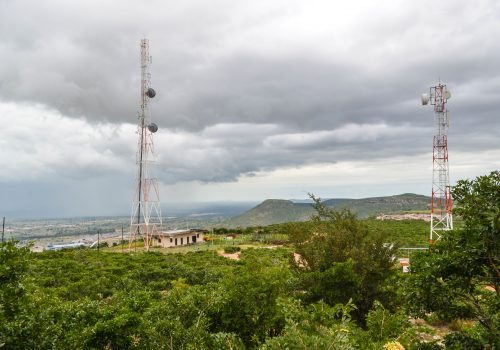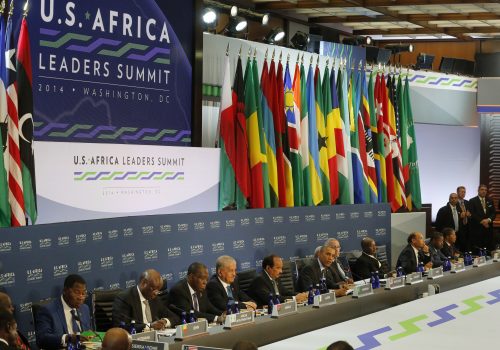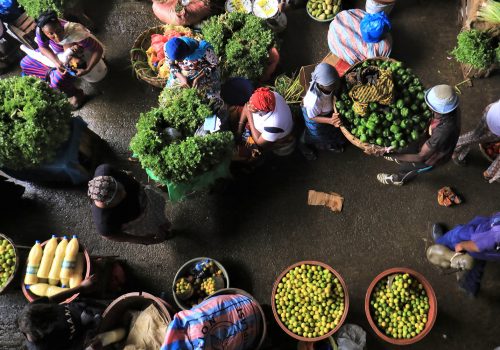In June, Nigerian President Muhammadu Buhari blocked Twitter for all of Nigeria in what many believe was a response to the company deleting a tweet of his and suspending the leader’s account. While the government lifted the ban last month, the initial decision came as a shock to Nigerians—especially since many have relied on Twitter to organize social movements including the #EndSARS protests last year.
It also served as a wake-up call to the United States. The episode is emblematic of choices being made by African nations on the core question of open internet access. Countries such as Uganda, Zambia, Ethiopia, and Sudan have restricted access to the internet this year in the midst of elections or civilian unrest. And Nigeria’s recent actions smack of Beijing’s long-championed policy of “internet sovereignty”—as does the Buhari administration’s reported meeting with the Cyberspace Administration of China (CAC) to discuss plans to build an internet firewall.
Over the past ten years, there has been a borderline obsession with China’s Belt and Road Initiative (BRI) within Washington’s foreign policy circles and a strong bi-partisan consensus that the twenty-first century will be defined by US-China competition on the global stage. Policymakers often employ simplistic tropes and frequently voice concern about the big-ticket, Chinese-financed road, rail, and dam projects across the continent that comprise Beijing’s Belt and Road Initiative. Over time, the Chinese have added to the traditional transport infrastructure projects by investing in telecom infrastructure, media assets, and light manufacturing—while the United States has failed to significantly deepen its commercial footprint in the region. US policy initiatives such as ex-President Barack Obama’s Power Africa and his successor’s Prosper Africa, housed in the United States Agency for International Development (USAID), have been limited in their budgets and buy in at the highest level of government.
But today, the real competition is in the digital, rather than the physical, realm: the struggle to shape Africa’s technology infrastructure and digital future, as well as how the next generation of Africans will consume, interact, and do business with the world.
Africa is not only the youngest continent in the world, with a median age of eighteen, but it is also urbanizing faster than any other: In the next ten years, it will be home to seventeen cities with more than five million inhabitants each. African youth are better connected than ever before and developing local start-up ecosystems that attract double-digit fundraising growth year-over-year to tap into the continent’s 1.2 billion-person market. The means by which Africans view and see the world will be increasingly shaped by the hardware and software they use—and, perhaps more importantly, to which they have access.
While trucks, trains, and planes have long dominated how African consumers and businesses are able to transport and interact with global markets, the digitization in the last decade, particularly on mobile devices, has changed this equation. Competition between China and the United States is playing out at each of the six layers of Africa’s technology stack: undersea cables and satellites; telecommunication companies and internet service providers; mobile handsets; data networks; operating systems; and apps, mobile money, content platforms, and web browsers. In contrast to US investment, which comes through American companies, Chinese investments in telecom infrastructure are often more intertwined with government backing and support.
As more Africans come online, they’ll increasingly interact with this technology stack—knowingly or not—and the information they consume could vary greatly depending on the digital infrastructure that supports these interactions.
For example, Shenzhen-based Transsion accounts for almost half of all smartphones, with the next nearest competitor, Samsung, holding only 16 percent market share. Increasingly important is the preferential treatment Transsion can give its own apps (similar to how Google and Apple operate), including market-leading music streaming service Boomplay and mobile-money provider PalmPay. Much of this consumer experience is supported behind the scenes by ZTE and Huawei infrastructure.
By 2025, Africa’s mobile penetration is expected to reach 50 percent, or 614 million connections, with 65 percent of those connections being smartphones. Like South America and India, a reduction in data costs and a growing desire for leisure activities will push individuals to the internet, and providers like Transsion are well-positioned to meet this need with their cheap, market-specific handsets.
With informal markets, which dominate African commerce as the continent moves into the digital world, this technology stack will only rise in importance. A critical example of an area of future competition is in digital currencies, including China’s digital yuan. While the utility of the digital yuan in Africa is currently minimal, the proliferation of Chinese handsets with pre-downloaded apps and wallets that could be loaded to support digital yuan transactions could significantly change this picture within the next ten to fifteen years, as both businesses and individuals embrace the currency.
As the Biden administration launches the large Africa Trade and Investment program at USAID and puts forth its official Africa strategy in early 2022, it must consider the continent’s digital infrastructure. By adopting a sectoral approach under Prosper Africa, with a focus on technology and digital infrastructure, the administration will be able to mobilize the resources and acquire the expertise needed to support increased, targeted American investment—much like the Obama administration did with Power Africa, but hopefully at a larger scale.
The picture is changing rapidly, and without a more concentrated effort to support Africa’s digital infrastructure, the United States risks losing a major opportunity to align itself with the continent’s arc toward innovation, technology, and youth-driven global culture.
Aubrey Hruby is a nonresident senior fellow with the Africa Center, co-founder of Insider, and an active investor in African start-ups.
Further reading
Thu, Apr 8, 2021
The digital infrastructure imperative in African markets
AfricaSource By Aubrey Hruby
Over the past two decades, Chinese companies have come to dominate the telecom infrastructure landscape in emerging markets. The United States can slow and possibly erode these Chinese gains by promoting innovative US technologies and providing resources to help unleash the second wave of the internet revolution in African countries.
Tue, Jun 1, 2021
A US-Africa summit done right
AfricaSource By Aubrey Hruby
The last few decades of global Africa policy can be defined in a single word: summitry. After five years of absence from the summit stage, a revived US-Africa summit under the Biden administration is a no-brainer.
Tue, May 25, 2021
Africa is America’s greatest geopolitical opportunity. Does the US know it?
AfricaSource By Rama Yade
Biden can further build ties with Africa: He should do so not only because these countries have long been underrepresented within leading multilateral organizations, but also because they offer innovative solutions to global challenges including terrorism, climate change, migration, debt, and COVID-19.
Image: Image: A man listening to earphones near store in Nigeria on November 15th, 2018. Photo via Unsplash by Muhammadtaha Ibrahim Ma'aji



